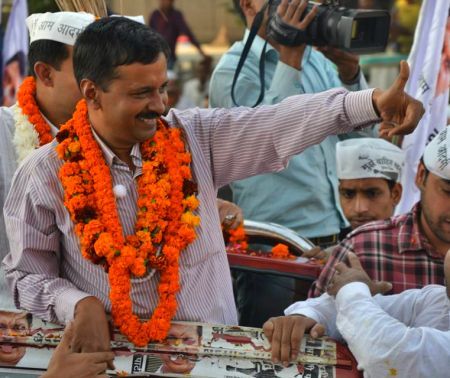 | « Back to article | Print this article |
 Perhaps Arvind Kejriwal got it right when he described the party as Shivji ki baraat. In other words, without the pejorative sense associated with it, a ragtag. New, and new to the business of government, it is faltering, notes Mahesh Vijapurkar.
Perhaps Arvind Kejriwal got it right when he described the party as Shivji ki baraat. In other words, without the pejorative sense associated with it, a ragtag. New, and new to the business of government, it is faltering, notes Mahesh Vijapurkar.
We don’t know the Aam Aadmi Party’s fate yet.
Notwithstanding the extreme viewpoints aired for or against it on the social media, pumped up by its rivals, several possibilities exist. It could, and this I admit is a bit far-fetched, sweep the Lok Sabha elections.
It may win a substantial number of seats. It could even win only a few and be spoilers in several, making any psephologist sweat if they were to be called to predict the elections now.
The undercurrent one senses now indicates that the AAP is a party with any of the above possibilities because there is a clear disenchantment with the political system which even (Congress vice president) Rahul Gandhi has noticed. This undertow was palpable even when the two contestants were only Gandhi and (BJP’s PM candidate) Narendra Modi till AAP emerged on the scene.
Those who considered a best bet to register disenchantment by NOTA, the party is factored in all poll-related discussions now.
So how would it perform in the Lok Sabha? Like Modi carries his credentials of a development-driven politician, AAP is trying to lead as an anti-corruption crusader and the people’s choice has to be between the two models.
AAP’s steps are clear when it wants to move its version of the Jan Lokpal bill on February 16, overriding the legalities of the process. It is trying to move the motion seeking its introduction and then let the country watch the fireworks.
The intensity of the undercurrent would be known only when the votes are counted but both the AAP and the media have not helped in the former remaining a grand and glorious band of people who came to rescue the country from politics as usual.
Perhaps Arvind Kejriwal got it right when he described the party as Shivji ki baraat. In other words, without the pejorative sense associated with it, a ragtag. New, and new to the business of government, it is faltering.
The circumstances of having to rule -- patently unexpected for AAP -- in Delhi has broken its stride of being a movement instead of being an opposition in the assembly where it would have conducted itself far superiorly than having to govern with no experience, not even legislative for its MLAs.
Now, the Congress and the Bharatiya Janata Party running the scanner and the media help in panning the party, the tasks ahead for the Lok Sabha polls become difficult. AAP would be truly tested here.
Apparently it is counting on the rival parties defeating the bill and in public view to turn the tables and show up both as parties that do not want to curb graft, being interested only in its perpetuation. After all, AAP’s roots are in the anti-corruption movement and it now gets its chance to place it in a different forum -- carry it from the streets to the legislative assembly. Notwithstanding this, one wishes the AAP’s model had been not the top-down, as it were, but bottom-up.
Of course the grandeur of a Shivji ki baraat taking reins in Delhi has its own attractions for the party to be noticed across the country; which, say, Haryana or Himachal Pradesh being captured may not have had.
It is like having bearded the beasts in their den. But the quick gains by visibility could be marred by the besmirching it is being subjected to. The breath-taking, fascinating speed in which all this happened is working to its disadvantage.
Had this been a long drawn movement which had converged in state capitals from big towns by exposing misgovernance and corruption in such places in civic administration, it would have formed the huge basis of a “let us govern ourselves” movement.
Cities and towns do no not need the kind of ideologies that parties talk about. Where is the need for a structure demolition in Ayodhya and claims to a pretence of secularism to administer them?
But it would have needed lot of patience with such a movement, and also wider participation in it by the middle class which blasts the AAP on social media. This patience is lacking among the voting and tax-paying citizenry to an extent that it begins to ask questions of manifesto implementation of the AAP by a set of parties, as have the political parties not necessarily known to keep their pre-election word.
Putting together such experience and putting together the building blocks would have been useful. The true and tested cadre that it would have built could have helped fight the Lok Sabha polls.
Sensing this gap, politicians of other parties are hoping to enter the AAP because it would need an army of candidates. They have begun to say their own parties were bad, the wisdom dawning on them suddenly. They see an outside chance of winning a seat worth a gamble.
This makes the AAP vulnerable to be a hijacked by the very forces it is trying to fight.